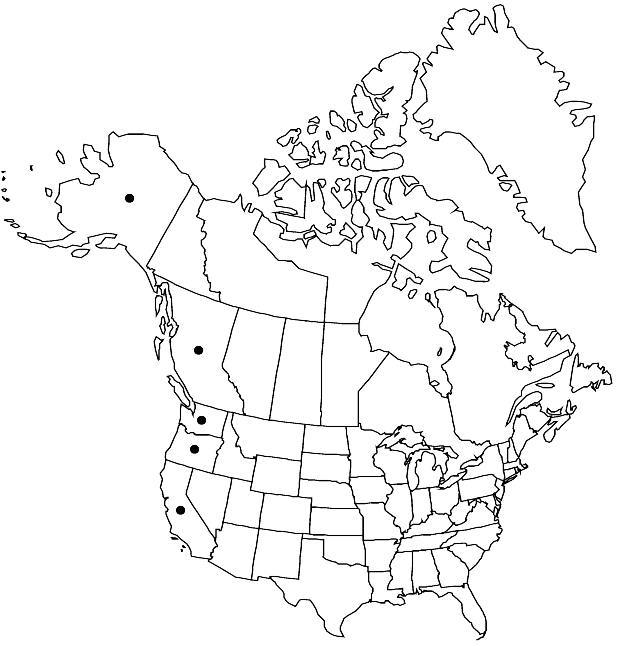Difference between revisions of "Cardamine occidentalis"
Fl. N.W. Amer., 50. 1897.
FNA>Volume Importer |
imported>Volume Importer |
||
| (6 intermediate revisions by 2 users not shown) | |||
| Line 7: | Line 7: | ||
|year=1897 | |year=1897 | ||
}} | }} | ||
| − | |basionyms={{Treatment/ID/ | + | |special_status={{Treatment/ID/Special_status |
| + | |code=E | ||
| + | |label=Endemic | ||
| + | }} | ||
| + | |basionyms={{Treatment/ID/Basionym | ||
|name=Cardamine pratensis var. occidentalis | |name=Cardamine pratensis var. occidentalis | ||
|authority=S. Watson | |authority=S. Watson | ||
| + | |rank=variety | ||
| + | |publication_title=in A. Gray et al., Syn. Fl. N. Amer. | ||
| + | |publication_place=1(1,1): 158. 1895 | ||
}} | }} | ||
|synonyms={{Treatment/ID/Synonym | |synonyms={{Treatment/ID/Synonym | ||
|name=Cardamine neglecta | |name=Cardamine neglecta | ||
|authority=Greene | |authority=Greene | ||
| + | |rank=species | ||
}} | }} | ||
|hierarchy=Brassicaceae;Brassicaceae tribe Cardamineae;Cardamine;Cardamine occidentalis | |hierarchy=Brassicaceae;Brassicaceae tribe Cardamineae;Cardamine;Cardamine occidentalis | ||
| Line 37: | Line 45: | ||
-->{{#Taxon: | -->{{#Taxon: | ||
name=Cardamine occidentalis | name=Cardamine occidentalis | ||
| − | |||
|authority=(S. Watson) Howell | |authority=(S. Watson) Howell | ||
|rank=species | |rank=species | ||
| Line 51: | Line 58: | ||
|publication title=Fl. N.W. Amer., | |publication title=Fl. N.W. Amer., | ||
|publication year=1897 | |publication year=1897 | ||
| − | |special status= | + | |special status=Endemic |
| − | |source xml=https:// | + | |source xml=https://bitbucket.org/aafc-mbb/fna-data-curation/src/2e0870ddd59836b60bcf96646a41e87ea5a5943a/coarse_grained_fna_xml/V7/V7_737.xml |
|tribe=Brassicaceae tribe Cardamineae | |tribe=Brassicaceae tribe Cardamineae | ||
|genus=Cardamine | |genus=Cardamine | ||
Latest revision as of 22:35, 5 November 2020
Perennials; glabrous or hirsute. Rhizomes (tuberiform, fragile), ovoid or globose at base of stem, 3–10 mm diam., (fleshy). Stems (simple from base), erect to ascending, (not flexuous), unbranched or branched distally, 1–5 dm, glabrous or pubescent proximally. Basal leaves not rosulate, pinnately compound, (3 or) 5 (or 7)-foliolate, 2–10 cm, leaflets petiolulate or subsessile; petiole 0.5–6.5 cm; lateral leaflets petiolulate or subsessile, blade similar to terminal, ovate, smaller, margins entire; terminal leaflet (petiolule 0.03–0.18 cm), blade orbicular to broadly ovate or subcordate, 0.5–2 cm × 7–25 mm, base cordate to rounded, margins entire or repand, (surfaces glabrous). Cauline leaves 3–7, (3 or) 5 or 7-foliolate (middle ones 5 or 7-foliolate, smaller distally, becoming 3-foliolate), petiolate; petiole 0.5–3 cm, base not auriculate; lateral leaflets similar to terminal, smaller; terminal leaflet blade obovate to oblanceolate, 0.5–2.6 cm × 3–13 mm, margins shallowly toothed, entire, or repand. Racemes ebracteate. Fruiting pedicels divaricate-ascending, 7–18 mm. Flowers: sepals oblong, 1.7–2 × 1–1.2 mm, lateral pair not saccate basally; petals white, oblanceolate, 4–6 × 1.5–2 mm, (not clawed); filaments: median pairs 2–2.5 mm, lateral pair 1–1.5 mm; anthers ovate, 0.3–0.5 mm. Fruits linear, (torulose), 1.5–3.3 cm × 1.7–2.2 mm; (valves glabrous or sparsely pubescent); ovules 18–40 per ovary; style 0.5–1.5 mm. Seeds brown, ovoid, 1–1.6 × 1–1.2 mm. 2n = 64.
Phenology: Flowering Apr–Jul.
Habitat: Muddy grounds, lake margins, shallow streams, meadows
Elevation: 150-1500 m
Distribution

B.C., Alaska, Calif., Oreg., Wash.
Discussion
Selected References
None.